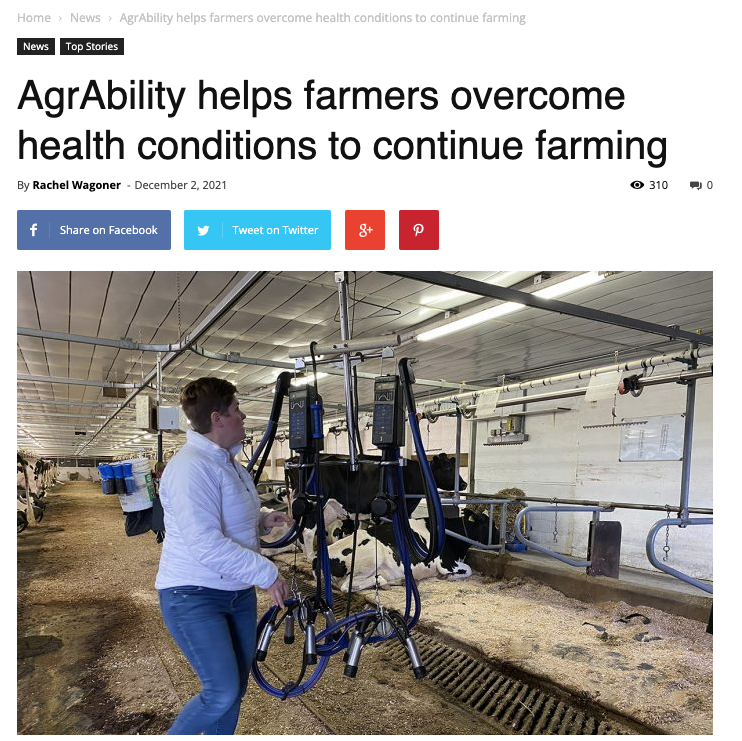AgrAbility helps farmers overcome health conditions to continue farming
Dairy Farmer and AgrAbility PA Customer Chelsi Shultz shared her story with Farm and Dairy -- an agricultural publication that has served the rural communities of Ohio, Pennsylvania, and West Virginia for more than 100 years. Shultz was diagnosed with shoulder impingement in both shoulders.

“It was all of that range of motion using your shoulder, and you use your shoulders in most things. It was a lot of pain.”
Chelsi Shultz talking about her chronic shoulder pain.
Shultz heard about the AgrAbility program and reached out for help. The program worked with her to find a solution — a carrier system — and find funding for it so she could milk without pain. It helped her avoid surgery and get back to work, and it’s helped other people working on the farm avoid the health issues she’s had.
That’s what the AgrAbility program is all about. The national program, celebrating its 30th year in 2021, is known for its work with disabled farmers. The program was first funded in 1991 by the farm bill and continues to receive funding through the U.S. Department of Agriculture and National Institute of Food and Agriculture.
What often comes to mind when thinking about AgrAbility is the big fixes it makes happen — like a tracked wheelchair for a paralyzed farmer or hand controls for an amputee.
“It doesn’t have to be a severe disability. It can be any health condition that is impacting their ability to work on their farms. It’s about keeping people actively working on their farms and working safely.”
Abbie Spackman, project assistant with AgrAbility Pennsylvania.
Shultz didn’t know about AgrAbility until she asked a female dairy farmer Facebook group for advice about what to do for her shoulder pain. Some mentioned the carrier system.
“I knew it’d be nice, but it was expensive. I knew it wasn’t going to be something we could do on our own.”
Chelsi Shultz talking about a carrier system for dairy production.
Several people suggested reaching out to her state’s AgrAbility program. So, she went through the process to get assessed. Shultz was also in charge of calf care and was having issues pulling the heavy cart full of milk buckets to feed the calves.
AgrAbility helped Shultz get funding for the carrier system and a powered milk cart through the Office of Vocational Rehabilitation.


OVR paid for the entire cost of the system — about $40,000 — while the farm had to pay to replace its pipeline system to fit with the new rail system in the barn. Now, instead of lifting the milkers, the equipment can be pushed along the rail system that winds around the barn. The weight is taken off the person milking, Spackman said.
Before the carrier system was installed, Shultz’s husband and the farm’s employee were also starting to complain of shoulder pain. That all stopped once the rail system was in place.
“It didn’t only help me, but it helps other people that are doing the work on our farm. And it hasn’t changed our milking time.”
Chelsi Shultz talking about the assistive technology in the dairy barn.

